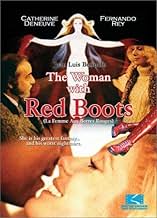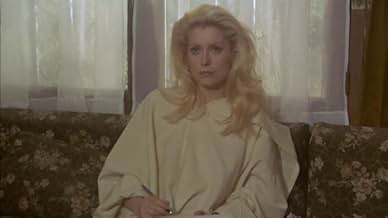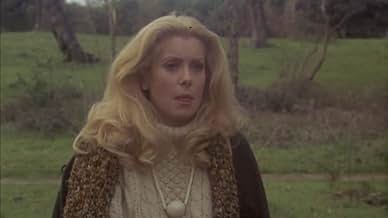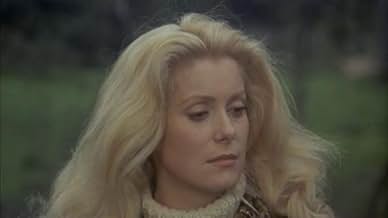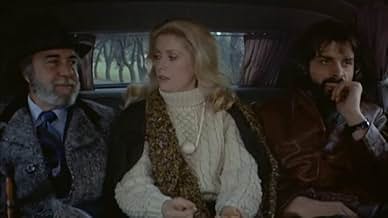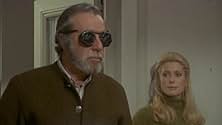Agrega una trama en tu idiomaA young writer uses her charms to seduce and destroy a cynic who has declared war on art.A young writer uses her charms to seduce and destroy a cynic who has declared war on art.A young writer uses her charms to seduce and destroy a cynic who has declared war on art.
- Dirección
- Guionistas
- Elenco
José María Caffarel
- Lawyer
- (sin créditos)
Ángel Menéndez
- Marc's Mother-in-Law
- (sin créditos)
Antonio Orengo
- Editor
- (sin créditos)
Nélida Quiroga
- Marc's Father-in-Law
- (sin créditos)
Pilar Torres
- Young Françoise LeRoi
- (sin créditos)
Opiniones destacadas
I do not find this film pretentious at all. It has a light touch which even Bunuel himself did not always achieve, and his son in directing this film deserves a lot of praise for his imaginative use of fantasy and how there is little between reality and that place which seems a parallel reality. Catherine Deneuve is at her finest striding around like a mysterious figure out of a fairy tale, elusive as Alice in Wonderland and Little Red Riding Hood. And of course there has to be a castle ( or rather a grand French Manor ) and Fernando Rey, also at his best a sort of Ogre at its centre. Rooms transform themselves in the same scene and Laura Betti, far from being just a maid in it has her own glorious transformative self. Things as in life are not what they seem, and the film portrays for me how we must bear all this very real unreality with lightness, elegance and a charming game of chess. I loved every second of it and only the younger male actors weighed a little heavily in the scenario. Sadly I do not think this film has been released in the UK and I fear that they tolerated the superb ' Belle de Jour ' for its more sensational aspects. I think both that film and this rank very highly among Deneuve's outstanding contribution to cinema, and if it hadn't been for the sullen faces of the younger men I would have given it a 1O. Their bearable lightness of being was not quite light enough.
Whilst it has to be said that this rather silly and I'm afraid somewhat pretentious, I enjoyed it. If Mr Bunuel junior had been able to shrug off the onerous responsibility of being his father's son, this could have been a less seriously intended and much more fun film. However, I am being picky for there are enough stimulating lines of dialogue and provocative visuals to keep things moving and we have the two stars, on top form, as well. Fernando Rey is at his impish best, and if at times we are not too sure what is going on, he never seems to have any such doubts. At once creepy, half crazed and completely mad he slides, bounds and crashes throughout his many scenes. And Catherine, seven years after her amazing performance in Mr Bunuel senior's classic, Belle de Jour, she is back again giving her all for his son. She does wear red boots a lot of the time but I saw nothing significant in this to warrant the title but she looks lovely in them. In truth she looks lovely without them too and with and without all her clothes. Well worth a watch.
The younger Bunuel's finest cinematic achievement is, perhaps unsurprisingly, the closest film – in style and plot – to his famous father's work; actually it proves more bizarre than any of them, if also resulting in a slightly pretentious whole. Incidentally, as would be the case with his subsequent effort, LEONOR (1975; see review above), the old man's regular collaborator Jean-Claude Carriere lent a hand in the screen writing and, characteristically, the title has very little bearing on the storyline.
It benefits greatly from the presence of two of the elder Bunuel's most prominent stars: Catherine Deneuve (typically enigmatic, and shown in a quick, unexpected and genuinely heart-stopping full-frontal nude early on that was shrewdly incorporated into the theatrical trailer) and Fernando Rey (at his most Macchiavellian and eccentric), who had already appeared together in his masterful TRISTANA (1970); no less notable, however, is Laura Betti's belated participation as Rey's snobbish housekeeper. Frankly, I have watched several of Deneuve's movies over the years and, while this may not be one of her more popular movies, I doubt if she (who was 31 at the time) ever looked lovelier on screen!
Basically, the premise deals with ageing financier Rey, an aficionado of 3-D chess (at which novelist Deneuve emerges to be remarkably adept herself), who likes to treat human beings in much the same way as pawns on a board; besides the female lead, also involved in his machinations are her painter boyfriend, another young man (who, having married into and being currently employed by a wealthy family, is unceremoniously given the gate when tragedy – and fate – renders him a widower) and the latter's impressionable wife herself (played by Euro-Cult favorite Emma Cohen). Ultimately, Rey is revealed to be an enemy of the arts who has been imprisoning and eliminating various protégées inside his mansion for some time!
However, the film's mainstay are its plethora of surreal moments, most of which are brought about by Deneuve's unexplained magical powers (that include second sight): Rey having a fit in an art gallery, then being led blindfold to the car by his devoted chauffeur, while ordering all the paintings therein to be sent to his residence; Deneuve following the young man, an unknowing admirer of her writings, down a stone stairway suddenly finds herself amid the vastness of a forest; she later imagines a visiting lawyer with a muddied boot on top of his head – though he can still feel the dirt it leaves on him!; Rey venting his frustration by biting down on a pillow, which he then cannot get rid of – until Betti turns up to do the same and rip it apart; despite his presumed neglect of the latter, he dreams of engaging in a gypsy dance (with violinist accompaniment, no less) with her; when Deneuve's two lovers quarrel at table in Rey's mansion, she has Cohen's husband shackled in chains; Rey himself drops a bottle of ancient and invaluable wine here when it metamorphoses into a hog's head in his hands; the picnic at the climax which, as the situation comes to a head, envelopes the scene in thunder and darkness (a scene which, bafflingly, not only turns to black-and-white on occasion but virtually breaks in half although, I cannot fathom whether this was an intentional artistic choice or a fault of the unimpressive DVD transfer!); and the Cocteau-like final shot as novelist and painter literally inhabit his latest canvas (which displayed amazing depth to begin with).
It must be said here that all three of Juan Luis Bunuel's films improved on a second viewing for me but this, in particular, is the one that really makes one bemoan the fact that his cinematic career never really took off!
It benefits greatly from the presence of two of the elder Bunuel's most prominent stars: Catherine Deneuve (typically enigmatic, and shown in a quick, unexpected and genuinely heart-stopping full-frontal nude early on that was shrewdly incorporated into the theatrical trailer) and Fernando Rey (at his most Macchiavellian and eccentric), who had already appeared together in his masterful TRISTANA (1970); no less notable, however, is Laura Betti's belated participation as Rey's snobbish housekeeper. Frankly, I have watched several of Deneuve's movies over the years and, while this may not be one of her more popular movies, I doubt if she (who was 31 at the time) ever looked lovelier on screen!
Basically, the premise deals with ageing financier Rey, an aficionado of 3-D chess (at which novelist Deneuve emerges to be remarkably adept herself), who likes to treat human beings in much the same way as pawns on a board; besides the female lead, also involved in his machinations are her painter boyfriend, another young man (who, having married into and being currently employed by a wealthy family, is unceremoniously given the gate when tragedy – and fate – renders him a widower) and the latter's impressionable wife herself (played by Euro-Cult favorite Emma Cohen). Ultimately, Rey is revealed to be an enemy of the arts who has been imprisoning and eliminating various protégées inside his mansion for some time!
However, the film's mainstay are its plethora of surreal moments, most of which are brought about by Deneuve's unexplained magical powers (that include second sight): Rey having a fit in an art gallery, then being led blindfold to the car by his devoted chauffeur, while ordering all the paintings therein to be sent to his residence; Deneuve following the young man, an unknowing admirer of her writings, down a stone stairway suddenly finds herself amid the vastness of a forest; she later imagines a visiting lawyer with a muddied boot on top of his head – though he can still feel the dirt it leaves on him!; Rey venting his frustration by biting down on a pillow, which he then cannot get rid of – until Betti turns up to do the same and rip it apart; despite his presumed neglect of the latter, he dreams of engaging in a gypsy dance (with violinist accompaniment, no less) with her; when Deneuve's two lovers quarrel at table in Rey's mansion, she has Cohen's husband shackled in chains; Rey himself drops a bottle of ancient and invaluable wine here when it metamorphoses into a hog's head in his hands; the picnic at the climax which, as the situation comes to a head, envelopes the scene in thunder and darkness (a scene which, bafflingly, not only turns to black-and-white on occasion but virtually breaks in half although, I cannot fathom whether this was an intentional artistic choice or a fault of the unimpressive DVD transfer!); and the Cocteau-like final shot as novelist and painter literally inhabit his latest canvas (which displayed amazing depth to begin with).
It must be said here that all three of Juan Luis Bunuel's films improved on a second viewing for me but this, in particular, is the one that really makes one bemoan the fact that his cinematic career never really took off!
Fernando Rey, a great and distinguished actor, starred in several masterpieces by Luis Buñuel, "Viridiana" (1961), "The Discreet Charm of the Bourgeoisie" (1972), "That Obscure Object of Desire" (1977). Together with Catherine Deneuve, he played in another masterpiece signed by the same Luis Buñuel, "Tristana" (1970). Juan Luis Buñuel, son of Luis Buñuel and director of this "La femme aux bottes rouges" (1974), brings together the two actors to manifest his own style, not far from that of his father, as a kind of continuation of his father's talent. But, unfortunately, it is nothing but an attempt, an imprint in the void. The script is weak, disappointing. From here, all the trouble. Despite the good players(we have in the cast also two fine Italian actors, Adalberto Maria Merli and Laura Betti), nothing can save the film from disaster. Even having the song originally from Romania (my home country), L'Alouette (Ciocirlia) performed by Michael Ionesco and His Orchestra Tzigane, he still fails. When I was a teenager, I was lovesick of surrealism, and I still am, but this is just bullshit, nothing more.
A writer called Francoise (Catherine Deneuve) meets an elderly millionaire (Fernando Rey) , the latter begins to manipulate her life , drawing in equally unsuspecting and luckly married Mark (Jacques Weber) . The wealthy old man is a chessman aficionado, who loves to treat his victims in much the same way as pawns on a board. In addition, the female lead, also involved in his machinations with her painter lover , another young man (Adalberto Merli) who, having married a beautiful girl (Emma Cohen) a tragedy becomes him a widower . Then the old man who lives at a country mansion along with his maid (Laura Betti) invites Francois and Mark , but there things go wrong .
This is the pretentious and sensuous story of La femme aux bottes rouges, a drama with surrealism and a sour portrait upon a few weird roles . This is a typical Luis Buñuel film style , as there are a lot of symbolism , social critique , mockery , and abstract scenes : like father like son , as Juán Luis Buñuel imitates heavily his father Don Luis . But here the script turns out to be confusing , disconcenting , and embarrassing, being written by Jean Claude Carriere, Luis Buñuel's regular, and director Juán Luis Buñuel himself . Despite the nice actors formed by an international cast from Spain, France and Italy , the picture results to be complex , tiring and nonsense . Stars two of the greatest figures of the European cinema at the time : the Euro cult actress Catherine Deneuve as a mysterious woman and Fernando Rey as an ageing financier, both of whom worked in the much better Tristana (1970) by Luis Buñuel . Being accompanied by a good support cast , but really wasted , such as : Jacques Weber , José Sacristán , Emma Cohen , Adalberto Maria Merli , Emma Cohen , the Italian Laura Betti , among others.
It displays an atmospheric and evocative cinematography by Leopoldo Villaseñor, shot completely in Madrid . As well as classic musical score from Symphony in D minor composed by César Franck , L'Alouette written by Michael Ionesco performed by Michael Ionesco and unspecified medieval songs performed by Groupe Chorale Siglo XV . This dramatic motion picture was middlingly directed by Juan Luis Buñuel . He was born on November 9, 1934 and he died in 2017 in Paris, France. He was a director and assistant director, he began as assistant director on several of the films directed by his father, Luis Buñuel . He was married to director Joyce Buñuel. Juán being especially known for making some films as Cita con la muerte alegre or At the Meeting with Joyous Death (1973 ), Calanda (1967) , La rebelión de los colgados (1986) and La mujer con botas rojas (1974). And directing some documentary , Telefims and TV series, such as : Gaudi y Barcelona, Guanajuato una leyenda , Fantomas , Histoires extraordinaires , Serie Rosa , Serie neira , Intrigues , among others . Rating : 5/10. Only for Catherine Deneuve and Fernando Rey fans.
This is the pretentious and sensuous story of La femme aux bottes rouges, a drama with surrealism and a sour portrait upon a few weird roles . This is a typical Luis Buñuel film style , as there are a lot of symbolism , social critique , mockery , and abstract scenes : like father like son , as Juán Luis Buñuel imitates heavily his father Don Luis . But here the script turns out to be confusing , disconcenting , and embarrassing, being written by Jean Claude Carriere, Luis Buñuel's regular, and director Juán Luis Buñuel himself . Despite the nice actors formed by an international cast from Spain, France and Italy , the picture results to be complex , tiring and nonsense . Stars two of the greatest figures of the European cinema at the time : the Euro cult actress Catherine Deneuve as a mysterious woman and Fernando Rey as an ageing financier, both of whom worked in the much better Tristana (1970) by Luis Buñuel . Being accompanied by a good support cast , but really wasted , such as : Jacques Weber , José Sacristán , Emma Cohen , Adalberto Maria Merli , Emma Cohen , the Italian Laura Betti , among others.
It displays an atmospheric and evocative cinematography by Leopoldo Villaseñor, shot completely in Madrid . As well as classic musical score from Symphony in D minor composed by César Franck , L'Alouette written by Michael Ionesco performed by Michael Ionesco and unspecified medieval songs performed by Groupe Chorale Siglo XV . This dramatic motion picture was middlingly directed by Juan Luis Buñuel . He was born on November 9, 1934 and he died in 2017 in Paris, France. He was a director and assistant director, he began as assistant director on several of the films directed by his father, Luis Buñuel . He was married to director Joyce Buñuel. Juán being especially known for making some films as Cita con la muerte alegre or At the Meeting with Joyous Death (1973 ), Calanda (1967) , La rebelión de los colgados (1986) and La mujer con botas rojas (1974). And directing some documentary , Telefims and TV series, such as : Gaudi y Barcelona, Guanajuato una leyenda , Fantomas , Histoires extraordinaires , Serie Rosa , Serie neira , Intrigues , among others . Rating : 5/10. Only for Catherine Deneuve and Fernando Rey fans.
¿Sabías que…?
- TriviaVISA DE CONTROLE CINEMATOGRAPHIQUE N° 42 424.
- Bandas sonorasSymphony in D minor
Composed by César Franck
Selecciones populares
Inicia sesión para calificar y agrega a la lista de videos para obtener recomendaciones personalizadas
- How long is The Woman in Red Boots?Con tecnología de Alexa
Detalles
- Tiempo de ejecución1 hora 35 minutos
- Mezcla de sonido
- Relación de aspecto
- 1.85 : 1
Contribuir a esta página
Sugiere una edición o agrega el contenido que falta

Principales brechas de datos
By what name was La femme aux bottes rouges (1974) officially released in Canada in English?
Responda
